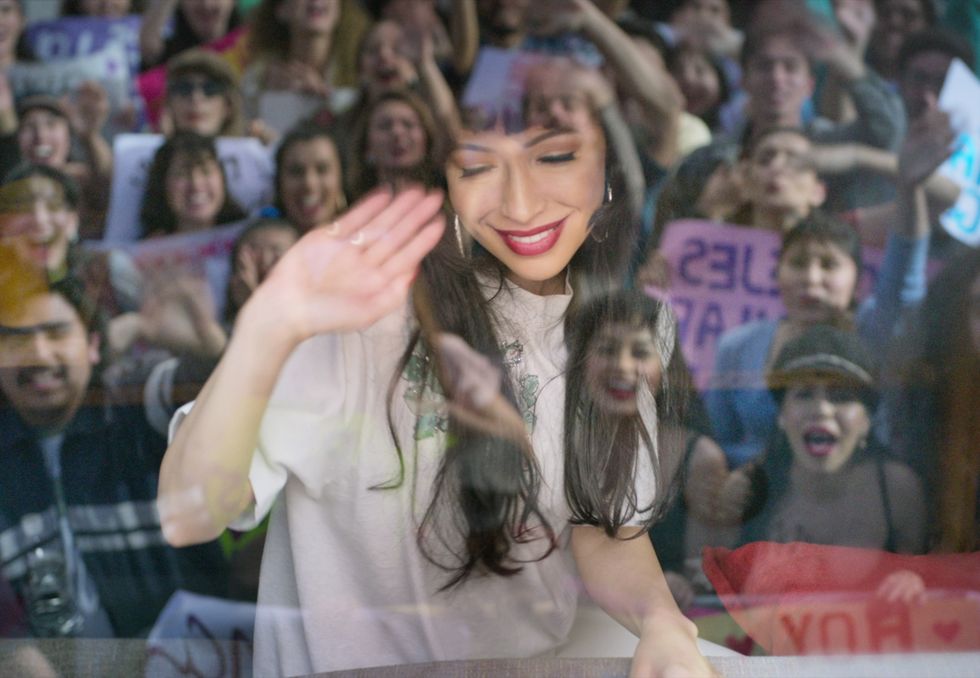
 Netflix’s announcement of Selena: The Series earlier in 2020 was exciting. As a proud Latinx child from a Salvadoran, immigrant household, I grew up listening to Selena’s music. Like many Latinx ’90s kids, Selena shaped and inspired me in more ways than one.
Netflix’s announcement of Selena: The Series earlier in 2020 was exciting. As a proud Latinx child from a Salvadoran, immigrant household, I grew up listening to Selena’s music. Like many Latinx ’90s kids, Selena shaped and inspired me in more ways than one.
I became a devoted fan the year after her death when I was just nine years old. I remember crying to my mamá when Selena (1997) the biopic starring Jennifer Lopez didn’t get a proper cinema release in my hometown. It wasn’t until the following year that I finally got to see the movie. Her tragic murder was even one of my first exposures to true crime, something that has continued to fascinate me to this day. In 2014, I had the privilege to go to Corpus Christi, TX. While I was there, I went to Selena’s museum run by her family, her memorial Mirador de la Flor, and even got to visit her resting place.
Since her death, her family’s had a tight hold on exclusive rights to Selena’s name, voice, photographs, and story, among other rights in perpetuity. Finally, her family would be letting us in on Selena’s younger years. Selena: The Series would breathe more humanity into a character who has since become an icon among the Latinx community. It would also give opportunity to a new generation of fans with her tragic death being almost 25 years ago.
However, my faith in this project dwindled when the cast was announced. Particularly who would be playing the coveted role of the late Selena. The choice of Christian Serratos, a white-passing, American actress with Mexican and Italian decent and Eurocentric features didn’t bode well with me. Yet again, Hollywood was white-washing a Brown, Mexican-American woman with real curves like they did in the 1997 biopic. Studios only allow a specific lens on how Latinx stories are told and portrayed in television and film. It painstakingly excludes those of Afro-Latinx, Indigenous, Asian, and other Latinx peoples within the intersections of the culture.
The Netflix series doesn’t show us anything we didn’t already know. It felt like the 1997 movie reheated with a few more nuances and bad wigs representing Selena’s many hair changes through the years. Something that deserved more exploration. Instead, Selena’s chameleon tendencies to change her look and style are pawned off as a shallow revelation where she tells her dad, “I don’t always know who I am … until I am.”
Rehashing the story of her father Abraham Quintanilla’s “American dream,” the series gives us more details on the struggles the family went through during it’s claim to fame. But it fails to show us the complexities of who Selena really was during all their trials and tribulations. For a series named after her, Selena plays out more like a secondary role. She comes off as a caricature of the Selena portrayal we’ve already seen on the big screen. A happy, easy-going young woman who is just along for the ride. She smiles, sings and doesn’t have very much to say. She certainly doesn’t question her strict manager/father who seems to get most of the spotlight in all nine episodes. There is no doubt in his involvement as a producer in this series.
Selena: The Series had ample opportunity to let us into the interior life behind her star persona and tragic death. But it fails to provide any insight from Selena’s perspective. It barely touches on what it was like to be a young artist breaking into the Tejano music industry and not being a fluent Spanish speaker. The series makes the family’s choice to play music for the Mexican market as nothing to do with their bi-cultural identity but more of a business move — one forced upon the kids by a father who is really chasing a failed dream of his own.
In Episode Two, Selena is pulled from school because of all the touring she has to do. But we don’t get to see how she felt about it. Surely as a teenager, she would have some thoughts and opinions regardless how passionate she was about her singing career! We get glimpses of school crushes and friends asking her to go out. But when her dad says no, she just pouts and accepts it. The truth is, Selena comes off two dimensional. She doesn’t get angry, she doesn’t make mistakes, and, heck, she can’t even catch a cold no matter how “ronca” she gets.
Her siblings Suzette and AB are fleshed out a little more. We even see some frustrations with their domineering father constantly putting pressure on them both. The whole quality of this series plays out similar to that of a Lifetime original movie. Wonky cuts, split screens, and awkward slo-mos, like when they introduce Chris Pérez. The whole thing feels cheap. Especially in the ninth episode when we get a glimpse of Yolanda Saldivar—like we all don’t know that name or what role she plays in Selena’s tragedy.
Selena: The Series‘s performances also fail to capture Selena’s talent and stage presence. The bad lip syncing and weak dance moves just further pulls the viewer out of what is supposed to be a compelling component. Unfortunately, the series’s mission is to only show a portrayal of Selena we already know. The one that is frozen in time and still able to line the family’s pockets as sole owners to all her exclusive rights and who gets to tell it. Something Selena’s widower Chris Pérez can’t even do.
I wanted to like it, I really did! I want to support anything Latinx, especially if it pertains to Selena—anything for Selenas! But it just feels like another exploit from her family. There is no denying Selena, even in death, has been their cash cow all these years. The Quintanillas make it clear. While they can divulge on more of the family’s struggle and personal lives, Selena’s younger years and thoughts are to remain shrouded in mystery. Abraham’s character says it best in episode four when he catches AB mingling with a young woman after the show. “An artist needs mystery. When you’re around them, there is no mystery, and then they don’t have to pay you.” I guess that goes for this series too.




![[REVIEW] BUGGING OUT WITH ‘THE MANDALORIAN CHAPTER 10: THE PASSENGER’](https://geekd-out.com/wp-content/uploads/2020/11/MandoChapter10-150x150.jpg)